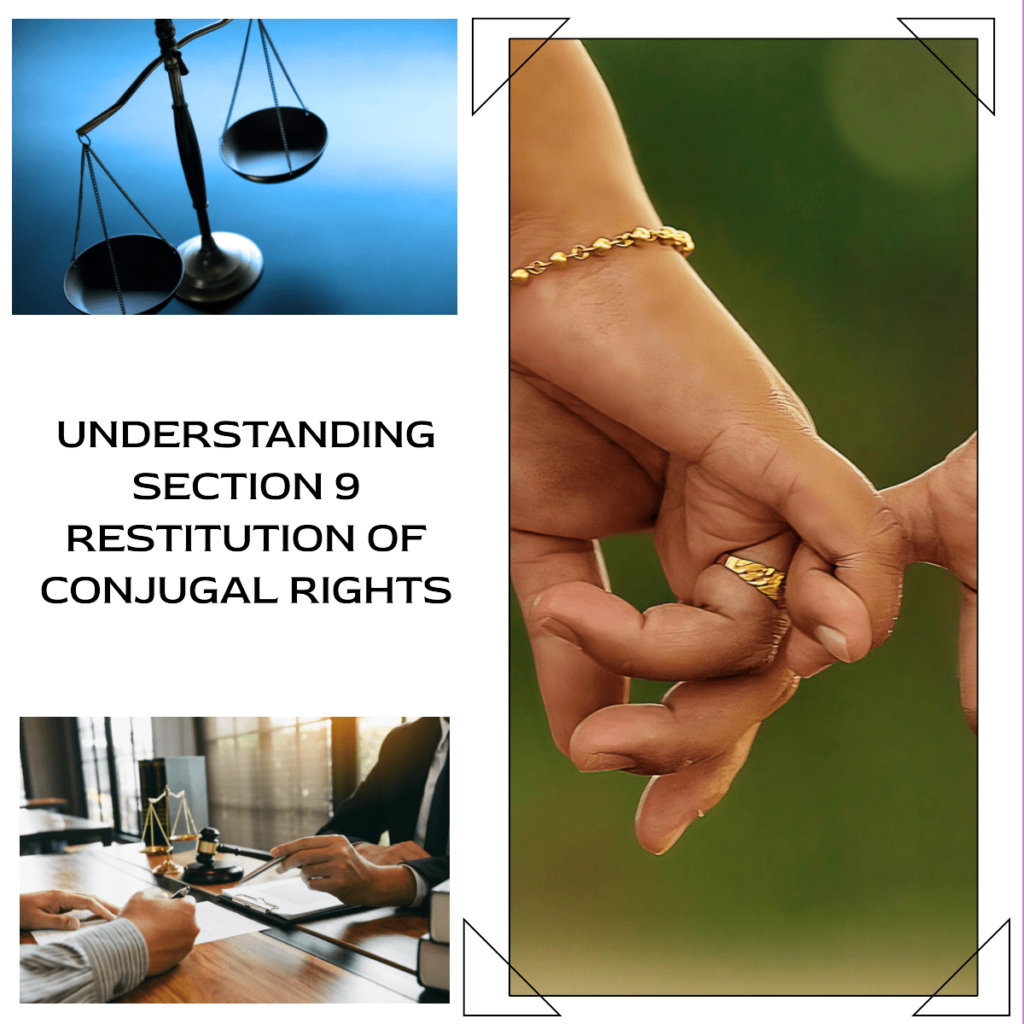
Section 9 of the Hindu Marriage Act: The Hindu Marriage Act, 1955, governs the solemnization and dissolution of marriages among Hindus. Section 9 of the Act deals with the concept of Restitution of Conjugal Rights. It is a significant provision designed to facilitate the reunion of spouses who have separated due to various reasons. In this post, we will explore the scope, purpose, essentials, and other aspects of Section 9 of the Hindu Marriage Act.
Scope of Section 9 of the Hindu Marriage Act
Section 9 of the Hindu Marriage Act primarily focuses on the restitution of conjugal rights, underscoring the fundamental right that entitles spouses to each other’s society and comfort. Moreover, the section offers a legal remedy to one of the spouses, referred to as the petitioner, to petition the court for an order requiring the other spouse, known as the respondent, to return to the matrimonial home and recommence their marital obligations.
Burden of Proof In Case Filed Under Section 9 of the Hindu Marriage Act
In cases filed under Section 9, it is paramount to recognize that the burden of proof squarely rests on the petitioner. The petitioner is tasked with the responsibility of clearly and unequivocally establishing that the respondent has withdrawn from their society without reasonable justification. This essentially signifies that the petitioner must furnish robust, compelling, and persuasive evidence to substantiate the claim that the respondent has indeed refused to fulfill their marital obligations.
Constitutional Validity
The constitutional validity of Section 9 of the Hindu Marriage Act has undeniably been upheld by Indian courts. This legal provision respects the fundamental right to marry and, at the same time, offers a structured mechanism for reuniting estranged spouses. Moreover, the Act is well-aligned with the constitutional principles of equality, liberty, and personal freedom. It ensures that the interests of both spouses are thoughtfully and judiciously considered.
Purpose of Section 9 of Hindu Marriage Act
The primary objective of Section 9 is, in essence, to facilitate the reunion of spouses who have previously separated. Its core purpose is to preserve the sanctity of marriage and encourage the harmonious conjugal life between the parties. To achieve this, the provision ensures that neither spouse can unreasonably refuse to fulfill their marital duties.
Cruelty or Any Other Marital Offence
While Section 9 deals primarily with the refusal of conjugal rights, a spouse may also plead cruelty or other marital offenses as a defence against a petition for restitution. This means that if one of the spouses has subjected the other to cruelty or any other serious marital offense, they can use it as a valid defence to avoid the decree for restitution of conjugal rights.
Decree for Restitution of Conjugal Rights Section 9 of Hindu Marriage
A decree for restitution of conjugal rights, in essence, is a court order favoring the petitioner. This order instructs the respondent to return to the matrimonial home and fulfill their marital obligations. It serves as a legal mechanism aimed at compelling the erring spouse to reunite with the petitioner, ultimately restoring the conjugal relationship.
Desertion: Essentials Of Section 9 of Hindu Marriage
In seeking restitution of conjugal rights. It is of utmost importance to establish the presence of desertion as a fundamental element. Desertion signifies the act of one spouse withdrawing from the companionship of the other, and this must occur without reasonable justification. Moreover, this desertion should be substantiated to have persisted for a specific statutory period.
Dissolution of Marriage
If the respondent fails to comply with the court’s decree for restitution of conjugal rights. It can eventually lead to a dissolution of the marriage. The petitioner can seek this dissolution on grounds of continued separation due to the initial refusal of the respondent to return to the matrimonial home.
Matrimonial Home
In matrimonial law, the concept of the matrimonial home holds a central place. It symbolizes the common abode of the spouses, where they reside together and dutifully fulfill their marital obligations. Consequently, a decree for restitution of conjugal rights frequently involves the respondent’s return to the matrimonial home.
Modification of Pre-existing Law
Section 9 has modified pre-existing matrimonial laws by allowing spouses to seek restitution of conjugal rights. Before the enactment of the Hindu Marriage Act, there was no specific legal provision to compel a spouse to return to the matrimonial home. This modification has provided legal recourse to resolve marital disputes.
Section 9 of Hindu Marriage Serves The Mutual Benefit
Section 9 effectively serves the mutual benefit of both spouses by encouraging them to reunite and actively cultivate a healthy conjugal relationship. This approach is instrumental in preserving the sanctity of marriage and preventing either spouse from unduly withdrawing from their marital obligations.
Restitution of Conjugal Rights
Restitution of conjugal rights is a legal remedy intended to reunite estranged spouses. It ensures that one spouse cannot unreasonably refuse to fulfill their marital obligations. However, the petitioner must prove that the respondent has withdrawn from the society without reasonable justification.
Sincerity in Demanding Restitution
In proceedings under Section 9, the petitioner’s sincerity in requesting restitution holds paramount significance. It is imperative that the petitioner truly aims at reconciliation, ensuring they are not exploiting their own faults or misdeeds. This sincerity remains a crucial factor for the court to consider when contemplating the requested relief.
Wilful Neglect
In cases involving the restitution of conjugal rights. It is crucial to distinguish between wilful neglect and valid reasons for separation. To clarify, wilful neglect implies a deliberate refusal to fulfill marital obligations, serving as a valid ground for seeking restitution.
Whether Deserted Husband Should Seek Reconciliation with His Wife
The deserted husband may choose to seek reconciliation with his wife, but it is not a legal requirement. The court’s role is to determine whether the desertion has occurred and whether there is a valid reason for granting restitution. The parties involved have the personal choice to seek reconciliation.
Conclusion
Section 9 of the Hindu Marriage Act plays a crucial role in reuniting spouses who have separated. Emphasizing the importance of preserving the institution of marriage. While it serves the purpose of ensuring that neither spouse unreasonably withdraws from their marital obligations. It also respects the principles of equality and personal freedom enshrined in the Indian Constitution. Understanding the intricacies of Section 9 helps both legal professionals and individuals seeking to navigate matrimonial disputes.



Leave a Reply